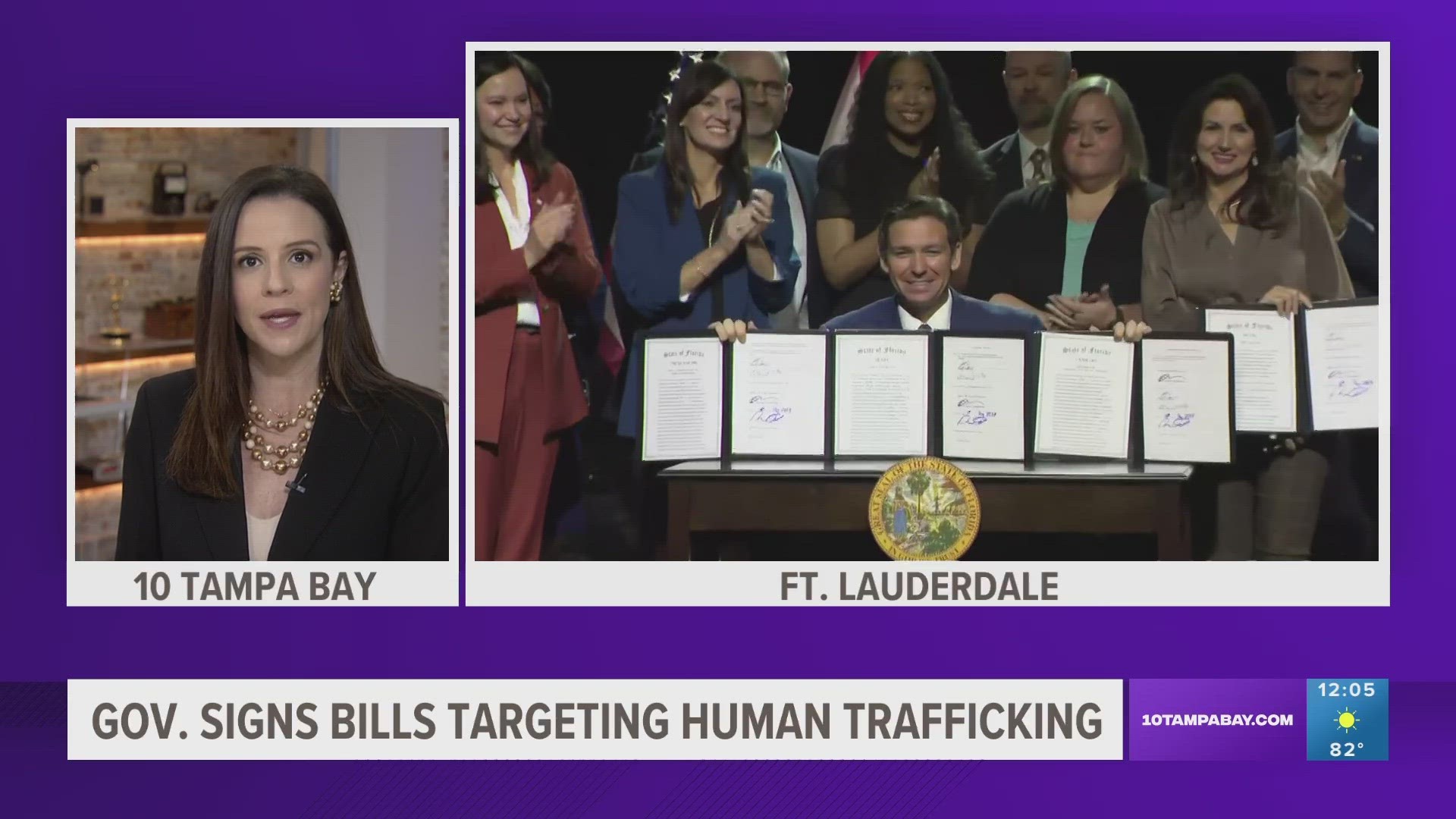LIGHTHOUSE POINT, Fla. — Florida Gov. Ron DeSantis signed four bills into law Tuesday increasing criminal penalties related to human trafficking, along with providing more resources to victims.
During a news conference in Lighthouse Point, which is a suburb of Fort Lauderdale, DeSantis explains rates of human trafficking have been increasing across the U.S., including in Florida.
An October 2022 report by the Department of Justice found the number of persons prosecuted for human trafficking nationwide increased from 729 in 2011 to 1,343 in 2020 — an 84% increase.
"[The state of Florida has] worked hard in the last couple of years on the interdiction of human smuggling and trafficking rings coming into Florida from the southern border, mostly through the I-10 and the Florida Panhandle," DeSantis said. "We're proud to have taken a lead on that. It has led to a lot of arrests, a lot of people taken off the streets who were really bad news."
According to the governor, human trafficking in the U.S. is a $150 billion illegal enterprise.
"I'm here to say [in] Florida, we want to use every resource at our disposal to put human traffickers out of business and in a jail," he said. "That's why we're here today."
Here's a breakdown of the bills signed by DeSantis.
This bill has the end goal to combat human trafficking while also supporting victims, DeSantis explained.
The legislation does a handful of things once going into effect on July 1, including:
- Establishes a civil action against traffickers and allows victims to recover damages from adult entertainment establishments
- Allows human trafficking victims to receive restitution from the sale of their trafficker's seized property
- Increases penalties for adult entertainment establishments that exploit minors from a first-degree misdemeanor to a third-degree felony
"This is something that is important to recognize when you're talking about human trafficking – some people that get forced into this, this kind of becomes all that they know," DeSantis said. "Sometimes it's hard to get out even if they ultimately want to.
"So this bill requires prostitution and lewdness offenders to attend an educational program that will direct them away from traffickers and toward supportive resources."
The new legislation also will now require recruited officers to receive four hours of training in identifying and investigating human trafficking.
The University of South Florida will also house and operate the statewide data repository for anonymous human trafficking data "to evaluate trends and evaluate the effectiveness of state initiatives in combating human trafficking."
This new bill signed into law will require hotels to follow current human trafficking awareness laws and to enhance protection for young children, who DeSantis calls the "likeliest targets."
"Under current law, [hotels] can kind of follow and then they get a slap on the wrist and all that – we're done with that," the governor said. "If you are in violation, you have a small period to cure and every day beyond that you don't cure, you're going to be liable for thousands of dollars in fines every single day."
According to DeSantis, this new law will be something that lights a fire – making sure establishments are taking this responsibility more seriously.
Once in effect July 1, facilities known as residential treatment centers for children where young people can receive intensive around-the-clock treatment for their behavioral health challenges will be required to place signs on their premises that warn children about the dangers of human trafficking.
SB 1690 also enhances security requirements at safe houses for children, now enforcing them to have age-appropriate programming "that will help kids identify the signs and understand the dangers of human trafficking and commercial sexual exploitation.":
The bill also raises the standard of care at foster homes and safe houses for victims of human trafficking.
"The wounds these victims bear are unique and traumatic, foster homes and safe houses need to have appropriate tools in place to meet the moment," DeSantis said.
The Statewide Council on Human Trafficking will also be required to conduct a study and make recommendations regarding the regulation of adult safe houses.
The governor explained this bill is a form of action to strengthen penalties for criminals who "prey on the victims [of human trafficking]."
HB 1465 makes human traffickers eligible for mandatory minimum sentences when they possess or fire a gun during the course of their trafficking crime.
"So if you violently force victims into trafficking in this state, you are going to pay a very, very stiff penalty," DeSantis said.
Florida Attorney General Ashley Moody spoke at the bill signing, voicing her support in efforts to stop human trafficking in the Sunshine State.
"We're not only going to go after these traffickers in a more significant way, [but] we're going to strengthen how we protect our victims after they're rescued," Moody explained. "If traffickers don't have operational support to traffic their victims, that's how we will stop trafficking."
The last bill the governor signed into law Tuesday provides a petition for human trafficking victim expunction.
This also requires all pleadings and documents related to the petition to be confidential and exempt from public record requirements.
Watch the full news conference down below.

